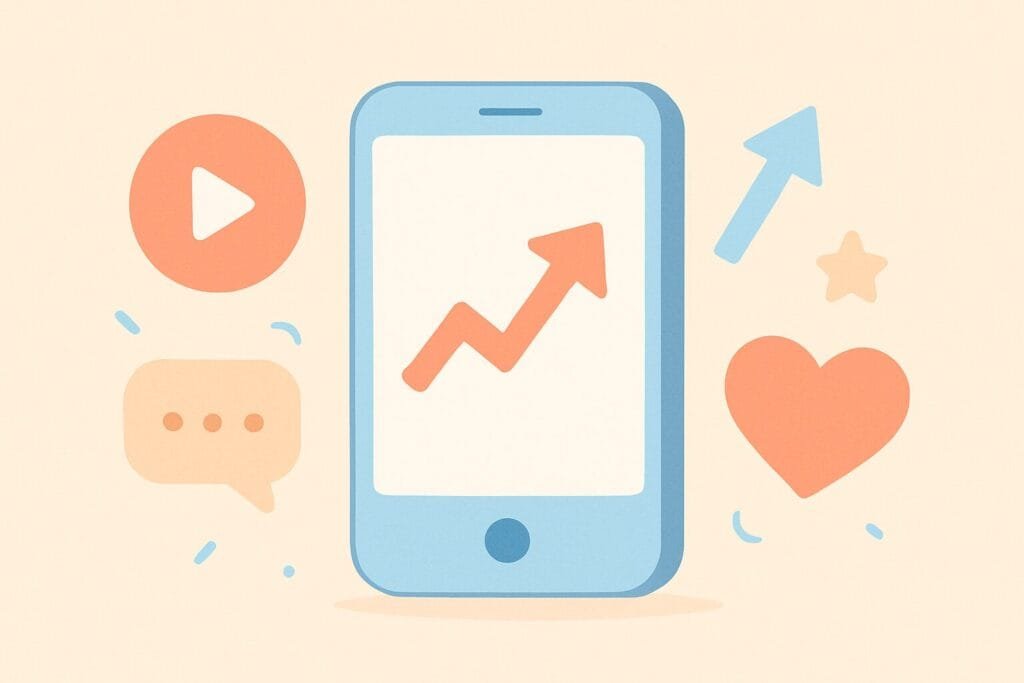In the competitive mobile app industry, millions of applications are launched every year. While many struggle to gain visibility, some apps suddenly go viral without spending a single dollar on advertisements. This phenomenon raises an important question: why do some apps spread organically while others rely heavily on marketing campaigns? Understanding the secrets behind organic app virality can help developers, startups, and marketers design better growth strategies.

1. What Does It Mean for an App to Go Viral?
An app is considered viral when its user base grows rapidly in a short amount of time, primarily driven by word of mouth, social sharing, and user engagement rather than paid advertisements. Virality often occurs because the app delivers unique value, sparks emotions, or creates a community-driven experience. Viral apps often appear on app store charts, get featured on media platforms, and spread quickly across different regions without massive ad budgets.
2. Key Reasons Why Apps Go Viral Without Ads
a. Solving a Real Pain Point
Apps that solve a genuine problem or make life easier naturally attract attention. For example, note-taking apps like Evernote or productivity tools like Trello gained popularity because they directly addressed users’ daily struggles. When users find real value, they are more likely to share the app with friends or colleagues.
b. Built-in Virality Features
Some apps are designed with mechanisms that encourage users to invite others. For instance, communication apps like WhatsApp and Telegram became viral because their core functionality depends on having other people join the platform. The more people use the app, the better the experience becomes, creating a self-sustaining viral loop.
c. Leveraging Social Media Trends
Apps that align with social trends or popular challenges have higher chances of being shared on platforms like TikTok, Instagram, and Twitter. An example is FaceApp, which became viral due to its AI photo editing filters that matched the trend of sharing transformations online.
d. Emotional Connection
Apps that create joy, surprise, humor, or nostalgia have stronger viral potential. Games like Flappy Bird went viral without ads because they triggered emotions—frustration mixed with fun—that encouraged users to challenge their friends.
e. Community and Network Effect
Some apps grow viral because they thrive on community participation. Reddit, for example, relies on user-generated content and communities (subreddits) that encourage users to invite like-minded people. This creates a network effect where growth is driven by the community itself.
3. Case Studies of Apps That Went Viral Organically
- Flappy Bird: A simple mobile game created by a solo developer. Without ads, it topped app store charts in 2014.
- Clubhouse: The audio chat app spread rapidly due to its invite-only model, creating exclusivity and curiosity.
- WhatsApp: Initially grew because of its practical communication function and word of mouth.
4. Comparison: Paid Growth vs. Organic Virality
| Aspect | Paid Growth (Ads) | Organic Virality |
|---|---|---|
| Cost | High budget required for ads and campaigns | Minimal or no advertising spend |
| Speed of Growth | Fast but depends on budget | Can be explosive if virality takes off |
| User Loyalty | Users may uninstall after ads stop | Higher loyalty due to organic discovery |
| Sustainability | Unsustainable without continuous ad spend | More sustainable if users keep sharing |
5. Strategies to Make Your App Go Viral Without Ads
If you are a developer or entrepreneur, here are strategies to increase your chances of achieving organic virality:
- Design for Sharing: Add easy sharing buttons and encourage social media interaction.
- Focus on Simplicity: Apps with simple design and easy usability spread faster.
- Use Gamification: Leaderboards, achievements, and challenges motivate users to invite others.
- Create Exclusivity: Invite-only models generate curiosity and hype.
- Leverage Influencers: Organic mentions by influencers can trigger viral loops without paid ads.
6. The Role of App Stores and Reviews
App stores play a crucial role in boosting virality. Positive reviews and high ratings improve an app’s visibility. The more organic downloads and engagement an app gets, the more likely it is to be featured in the Google Play Store or Apple App Store, which can skyrocket visibility further.
7. Conclusion
Some apps go viral without ads because they provide real value, emotional impact, or community-driven experiences. Unlike paid growth, organic virality is built on strong user engagement and word of mouth. Developers aiming for viral growth should focus on simplicity, shareability, and user experience. While not every app can achieve the level of Flappy Bird or WhatsApp, understanding these principles can significantly increase the chances of success.

